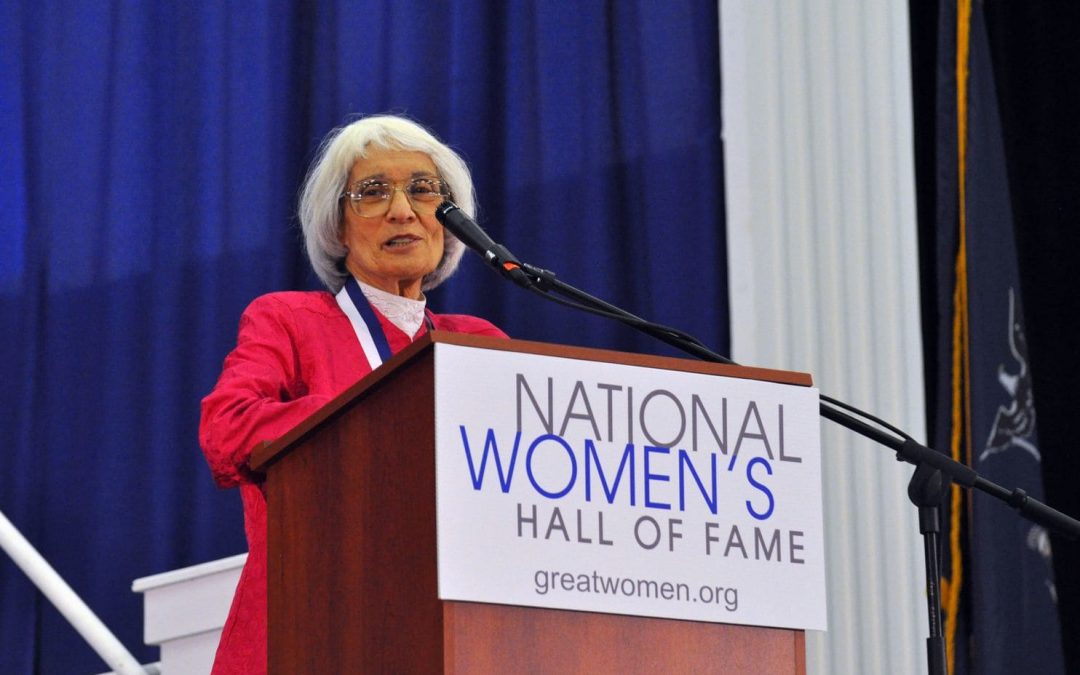Dr. Bernice Sandler never thought of herself as a feminist, but she dedicated much of her adult life to fighting sexual discrimination. She was an advocate and warrior for women’s equality. Her dedication to this cause resulted in Title IX, civil rights law of 1972 that barred sex discrimination by educational institutions that received federal funding. She died this week at the age of 90.
Sandler first became involved in this battle in the 1960’s through her own experiences in the workplace. Chastised for coming ‘on too strong’ for a woman, she quickly realized that she was missing out on opportunities for advancement as a professor that were open to her male colleagues (who were also strong but no one seemed to care). This was before the term ‘sexism’ was widely analyzed as it is today. But Sandler became aware of the inequities in education, sports, and later sensitive to the challenges of sexual harassment and discrimination.
Most professional women today would not have had the opportunities to pursue their chosen career if it weren’t for Dr. Sandler. College as well as graduate degrees in law and medicine are now open to women because of Title IX, and any discriminatory practices in admissions, recruiting and hiring due to gender are now illegal. The law requires that male and female students have equal access to admissions, resources and financial assistance, among other things.
Here’s what a difference Title IX has made in our lives.
It increased the awareness of sex discrimination in education. Before Title IX, the discriminatory practices of most institutions were invisible. The existing laws at the time, Title VI and Title VII, focused on discrimination based on race, religion, and ethnicity and sex, but there was no mention of sexual discrimination in education until Title IX. Colleges and universities had hidden quotas on the number of women admitted and this drastically limited the opportunities for women to pursue their desired careers.
Even though we yet don’t have a level playing field and women are discouraged to enter certain fields, there has been tremendous improvement from where we were before Title IX. Remember, Ruth Bader Ginsburg’s experience at Harvard Law being told by the Dean that she was taking a spot that a man is entitled to?
Most professional women today would not have had the opportunities to pursue their chosen career if it weren’t for Dr. Sandler. College as well as graduate degrees in law and medicine are now open to women because of Title IX, and any discriminatory practices in admissions, recruiting and hiring due to gender are now illegal. The law requires that male and female students have equal access to admissions, resources and financial assistance, among other things.
Here’s what a difference Title IX has made in our lives.
It increased the awareness of sex discrimination in education. Before Title IX, the discriminatory practices of most institutions were invisible. The existing laws at the time, Title VI and Title VII, focused on discrimination based on race, religion, and ethnicity and sex, but there was no mention of sexual discrimination in education until Title IX. Colleges and universities had hidden quotas on the number of women admitted and this drastically limited the opportunities for women to pursue their desired careers.
Even though we yet don’t have a level playing field and women are discouraged to enter certain fields, there has been tremendous improvement from where we were before Title IX. Remember, Ruth Bader Ginsburg’s experience at Harvard Law being told by the Dean that she was taking a spot that a man is entitled to?
Although formal quotas are now illegal despite ongoing gender bias. Title IX, however, gives us the legal right to fight any such discrimination.
Due to the increased awareness of unfair practices from Title IX, women’s advocacy groups began to form. Women learned the power of politics and how to influence change, and in the era of the Women’s March, #MeToo and #TimesUp, it’s challenging to think about a time when we did not feel empowered enough to organize and stand up for our rights. Title IX gave us the platform and now we stand on it with passion and pride.
The increased awareness of sexual discrimination also resulted in more attention being paid to it in the workplace. We now see the creation of diversity programs and unconscious bias programs in many companies, educational institutions, and the military. Many organizations have reviewed their hiring, recruiting, and promotion practices to ensure fair treatment. Public scrutiny in this area has pushed many companies to be accountable for their practices and publically announce their gender statistics each year. This attention to sexual discrimination will create more female friendly work environments over time.
Any programs and practices where women and girls were treated differently due to gender were abolished. Lots of women faculty starting receiving equity raises after Title IX. The focus on unfair practices brought the gender gap into the spotlight, an issue that remains in the spotlight today.

Recent Comments